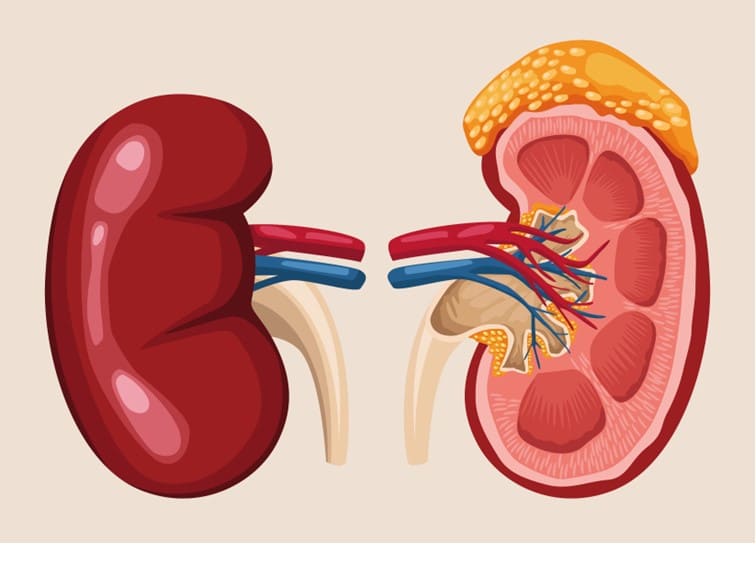Kidney function and diseases
Kidneys are basically involved in filtering and purifying blood and removing excess water, waste materials, toxins, and other harmful substances from the blood. As long as your kidneys remain healthy and perform their role efficiently, you will remain healthy. Once kidney disease creeps in it begins to harm your kidneys gradually hampering their function. Kidney disease occurs due to high blood pressure, diabetes, and various other long-term conditions. Kidney disease is a silently progressive condition. When your kidneys cannot perform their role properly, kidney disease sets in.
Important functions of Kidneys in the Body
Kidneys regulate electrolytes balance – potassium and sodium levels; blood pressure, PH, and Osmotic balance. They also produce hormones that regulate blood pressure and control the production of red blood cells.
One more prominent function of your kidneys is the following:
They make vitamin D useful to the body. Your kidneys convert vitamin D to its active form needed by the body. In patients with chronic kidney disease, low levels of vitamin D are a common finding. In some cases, the levels are severely low.
Kidney function and diseases
Your kidneys produce a biologically active form of vitamin D3 – i.e., 1, 25-dihydroxycholecalciferol from 25-hydroxycholecalciferol. The important factors that control this process include phosphorus and dietary calcium and parathyroid hormone secretion.
Therefore, in severely damaged kidneys, extremely low levels of the active forms of vitamin D3 and weak bones are common findings.
Chronic Kidney Disease
Long-term kidney damage due to chronic kidney disease is caused by high blood pressure and uncontrolled diabetes. If you have diabetes and high blood pressure you will become prone to chronic kidney disease. You can prevent the risk of kidney disease and damage by controlling your blood sugar levels and high blood pressure.
Nephrons are the tiny units of your kidneys that are involved in the very important function of filtering your blood and removing nitrogenous wastes, toxic materials, excess water, and other toxins from the body. High blood pressure increases the force or pressure in the glomeruli of your kidneys. Over a period of time due to excess pressure, the delicate mesh of tiny blood vessels within the glomeruli gets damaged and thus your kidneys function begins to decline. If this damaging process continues for long the deterioration may reach a point where your kidneys no longer perform their job properly. When a chronic kidney disease sets in, it may lead to renal failure. The person who has this condition must have to go for dialysis to save his life.
Complications of Kidney Disease
People with chronic kidney disease have a defective synthesis of 1,25-dihydroxycholecalciferol. For this reason, kidney disease is responsible for low vitamin D3 levels, less calcium absorption, osteoporosis, and weak bones. Kidney disease can also lead to other health conditions such as nerve damage, low calcium, and vitamin D, low iron, hemoglobin, and red blood cell count, and malnutrition.
Do You Know – Symptoms of Kidney Disease Go Unnoticed?
Kidney disease progresses silently and causes irreversible damage over a period of time. Depleting kidney function does not cause many effects on your body until the kidneys lose their complete functionality. Therefore, in the initial stages of kidney disease symptoms go unnoticed until they become severe.
Many people wonder about the early warning signs and symptoms of kidney disease. If you think you could be at risk of developing kidney disease, then look out for the following symptoms:
- Less urine output
- More frequent urination
- Fatigue
- Swollen feet and ankles
- Muscle cramping
- Poor appetite
- Trouble sleeping
- Difficulty concentrating
- Scaly and dry skin
- puffiness around the eyes in the morning
When your kidney disease progresses to kidney failure, the following severe symptoms manifest:
- Fluid retention
- Changes in urine output
- Loss of appetite
- Nausea
- Vomiting
- Low levels of vitamin D
- Low hemoglobin, iron, and red blood cells levels (Anemia)
- Decreased sex drive
- Sudden rise in potassium levels (hyperkalemia)
- Inflammation of the pericardium (a fluid-filled sac that covers the heart)
Bottom Line
Kidney function and diseases: Your kidneys are as precious as your heart, lungs, brain, and liver. When they get damaged – you will lose them forever. If you don’t pay attention to what is going wrong with your kidneys – you will never know until substantial damage has been caused. Unfortunately, you don’t get any clues whatsoever – in the beginning, but – still – there is a way to know or check the performance of your kidneys – Meet Dr. Kavitha Gone for a comprehensive examination and evaluation of any risk of developing kidney disease.

Leave a Reply